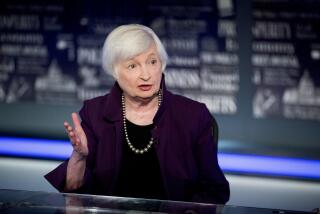Hands off the market
The fall of two investment banking titans this weekend and the travails of a giant commercial insurance firm so rattled policymakers that even Republican candidates were calling for more regulation to protect investors. Yet, in the short term, the most important thing that Washington can do for firms and investors alike is exactly what the Treasury Department and the Federal Reserve did for Lehman Bros. Holdings Inc., Merrill Lynch & Co. and American International Group: nothing.
After bailing out Bear Stearns Cos., Fannie Mae and Freddie Mac, the feds declined to prop up troubled Lehman, Merrill and AIG with tax dollars. Lehman filed for bankruptcy protection and Merrill sold itself to Bank of America for a song, while AIG forestalled its day of reckoning by borrowing $20 billion from its own subsidiaries.
The hands-off response sent the market a badly needed signal that mortgage brokers and lenders wouldn’t be the only big losers in the downturn. Companies such as Lehman made big bets on risky loans and, for a time, big profits as well. But the system they financed was based on a foolish assumption that the housing market would appreciate forever, so there was no need to worry about borrowers’ ability to repay. And the bailouts of Bear Stearns, Fannie and Freddie only reinforced the notion that big financial firms would be spared the consequences of the ensuing meltdown because they were just too big to fail.
Monday’s reaction from Wall Street seems to confirm how much investors had come to expect the government to guard them against failure. The New York Stock Exchange lost more than 500 points, the largest drubbing since the markets reopened after the 9/11 terrorist attacks.
Lehman is so deeply intertwined with other firms supplying credit around the world that its failure could topple a global string of financial dominoes. But just as the market created these entanglements, it needs to develop a system for unraveling them. That’s a part of managing risk, a task Wall Street took for granted too long.
Meanwhile, the feds should reconsider how they oversee a financial services industry that has changed radically over the last decade, creating increasingly complex financial instruments that are hard to understand and value. The housing bubble was a regulatory failure on the micro level, with unsound and predatory practices largely overlooked until subprime lenders started imploding. But the more enduring aspect is the absence of any mechanism to guard the financial system as a whole against future bubbles, or the creation of firms that truly are too big and intertwined to fail.
More to Read
Inside the business of entertainment
The Wide Shot brings you news, analysis and insights on everything from streaming wars to production — and what it all means for the future.
You may occasionally receive promotional content from the Los Angeles Times.










